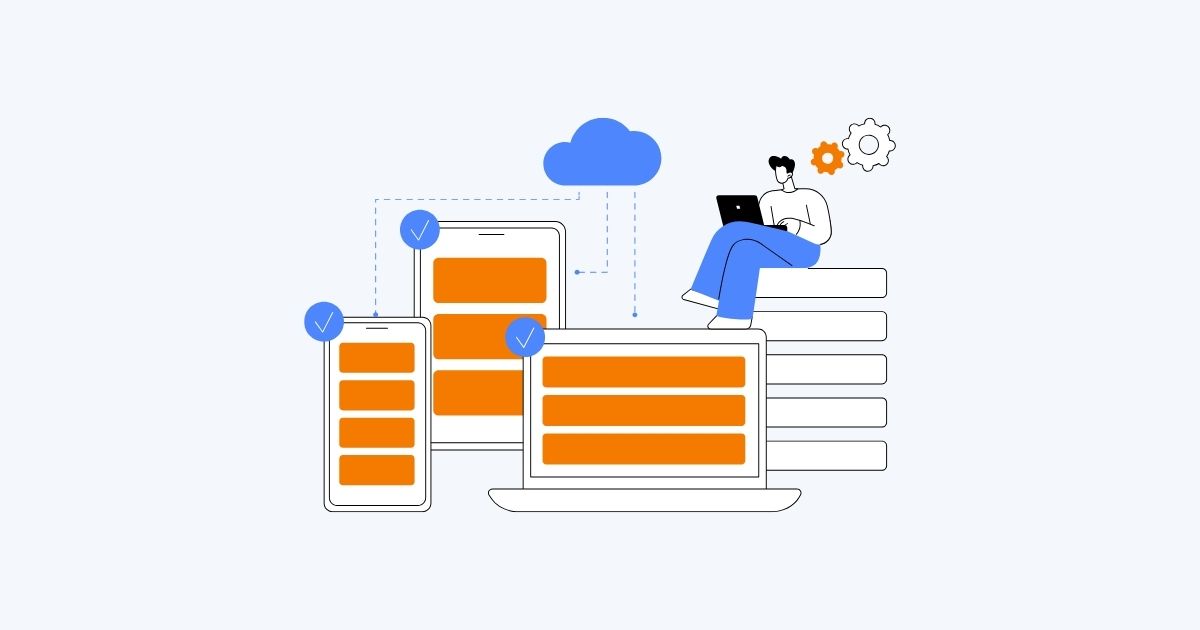A traditional contact center is structured something like this:
An endless row of tables with call agents picking and dropping calls. The atmosphere is noisy, with chatter and constant keyboard clicks. If the contact center runs 24/7, agents switch shifts, meaning the lights stay on, as do the machines and call lines.
Cloud contact centers have flipped this script.
A cloud contact center allows agents to operate remotely — even on a balcony in Venice! They also allow scalability and cost-saving benefits. Yet, these aren’t even the most significant gains.
This piece will discuss the above benefits and how Call Center Studio can help. But first, let’s describe a cloud contact center. Knowing this will help you understand the benefits better.
What is a Cloud Contact Center?
The main difference between a cloud contact center and a traditional one is interconnectivity. The latter relied on physical hardware and software, while the first leverages cloud computing.
Cloud technology enables the use of databases, servers, networks, software, analytics, and storage over the Internet. This connectivity eliminates operational costs associated with maintaining and installing on-premise infrastructure.
The agents only need the authentication details to access the cloud contact center system. No geographical restrictions exist, so they can work from home or an office and still get work done.

How Does A Cloud Contact Center Work?
Cloud centers operate on the cloud, a remote server infrastructure managed by a service provider like Genesys.
But wait, what is Genesys Cloud Contact Center?
The Genesys Multicloud CX product line runs a Genesys cloud contact center. This server allows your contact center to manage all client interactions through a centralized hub. Another service provider is Contact Center AI. This platform uses Google artificial intelligence (AI) to offer agent assistance, conversational AI, and customer sentiment analysis features.
Below are some elements the global top 5 cloud contact center providers use to operate:
Cloud infrastructure
Cloud contact centers take up handling all the hardware and software. They buy, install, distribute, and maintain these systems to ensure smooth operations on your side. Your investment is acquiring and using these features, nothing more or less!
Omnichannel Routing
Customers reach contact centers via phone, email, web chats, SMS, and social media. Cloud contact centers offer call center routing, basing the connectivity on call type or agent skills. They may also route using factors like agent availability and customer history data.
This intelligent routing capability improves the first resolution rate and creates a more personalized customer experience (CX).
Agent Management
Cloud contact centers offer management and monitoring tools to streamline agent performance tracking. Some notable features include performance dashboards, call recording, and real-time call monitoring.
The insights you get here can help improve service delivery and highlight training needs.
Interactive Voice Response (IVR)
Cloud call centers use IVR systems to automate routine customer inquiries. IVRs also direct callers to the most qualified agent or resource based on the issue. The resource might be a FAQ section, an article, a user manual, or another knowledge base.
IVRs expedite service delivery and boost customer satisfaction.
Reports and Analytics
Gartner Contact Center is a goldmine of analytics and reports that contact centers use to improve service provision. These insights highlight customer behavior, agent compliance, and performance. You also get data on the contact center’s overall effectiveness.
This information helps you offer training where necessary. This data lets you personalize services, improve workflow, and boost customer satisfaction.
What is An Omnichannel Cloud Contact Center?
The Latin phrase ‘omni’ means everything or all.
In a cloud contact center, omnichannel means providing customer service across all channels. These channels are phone calls, web chats, emails, social media, and SMS. The parent concept of an omnichannel cloud contact center is to integrate all these channels into one. This allows agents and customers to switch from one to the other without data loss or repetitions.

What Are The Main Benefits Of Cloud Contact Centers?
Contact centers’ older operational models were costly, noisy, and inconvenient. These meant long call times, lower customer satisfaction, and agent fatigue.
An omnichannel cloud contact center steps in to scrap these inconveniences by offering:
Cost-Effectiveness
With a cloud contact center, you won’t incur upfront purchases of on-premise hardware and software. That’s on the service provider, who also covers maintenance costs. Your business will only pay for the features you use.
Scalability and Flexibility
A cloud contact center business can scale up or down without interruptions. You can onboard extra features based on your client’s needs and offboard unproductive ones.
It also allows businesses to adopt flexible and remote work arrangements for call agents. This opens doors to onboarding remote top global talent. Another benefit is better 24/7 operation since your workforce may be dispersed globally.
Boosts Customer Experience
A happy client appreciates the consistent service offered by an omnichannel cloud contact center. Knowing they’ll get help through any of their preferred channels instills confidence in the brand. This leads to higher customer loyalty and satisfaction rates.
Boosts Agent Performance
AI-powered cloud contact center tools help streamline agent workflows. Call recording, performance trackers, and agent compliance data empower this streamlining. This makes one of the AI benefits of cloud contact center services, boosting agent performance.
Boost Contact Center Performance
A cloud contact center’s final benefit to a call center is its overall efficiency boost. The omnichannel system seamlessly streams in client concerns. The call routing capabilities link clients to the best-qualified agents. Integration with CRMs and analytics offers proper client management and better data collection.
The results may be faster resolution rates and lower turnaround rates. You’ll also celebrate better customer and agent engagement, loyalty, and satisfaction.
Is a Cloud Contact Center Worth The Investment?
Yes, a cloud contact center is worth every penny.
The cloud contact center integration reduces running costs and improves agent performance. It also boosts customer experience, which means better customer loyalty, satisfaction, and brand awareness.
Your only job is to find a reliable cloud contact center provider that matches your needs. Call Center Studio offers all the above, making it a great place to begin your search. It provides workforce engagement platforms, software, automated customer service, omnichannel features, and analytics.
Contact us today to start harnessing all the above cloud contact center perks!




